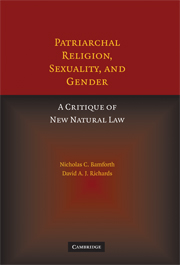Book contents
- Frontmatter
- Contents
- Acknowledgments
- 1 New Natural Law in Context
- 2 Criteria for Evaluating New Natural Law
- 3 The Architecture and Reach of New Natural Law
- 4 Internal Consistency (1): Is New Natural Law Secular?
- 5 Internal Consistency (2): New Natural Law and Thomas Aquinas
- 6 Substantive Appeal (1): What's Wrong with Homophobia and Sexism?
- 7 Substantive Appeal (2): New Natural Law, Sexism, and Homophobia
- 8 Moral Absolutes and the Possible Fundamentalism of New Natural Law
- 9 New Natural Law and Patriarchal Religion
- 10 Concluding Observasions, and Christian Alternatives to New Natural Law
- Bibliography
- Index
7 - Substantive Appeal (2): New Natural Law, Sexism, and Homophobia
Published online by Cambridge University Press: 14 August 2009
- Frontmatter
- Contents
- Acknowledgments
- 1 New Natural Law in Context
- 2 Criteria for Evaluating New Natural Law
- 3 The Architecture and Reach of New Natural Law
- 4 Internal Consistency (1): Is New Natural Law Secular?
- 5 Internal Consistency (2): New Natural Law and Thomas Aquinas
- 6 Substantive Appeal (1): What's Wrong with Homophobia and Sexism?
- 7 Substantive Appeal (2): New Natural Law, Sexism, and Homophobia
- 8 Moral Absolutes and the Possible Fundamentalism of New Natural Law
- 9 New Natural Law and Patriarchal Religion
- 10 Concluding Observasions, and Christian Alternatives to New Natural Law
- Bibliography
- Index
Summary
In Chapter 6, we saw – via a discussion of a series of theories, and eventually by reference to the notions of autonomy and the need to combat moral slavery – how arguments which involve sexism and homophobia can properly be viewed as unappealing, especially in terms of the moral value of autonomy and by reference to the notion of moral slavery. In this chapter, we tie this analysis to the new natural lawyers' arguments concerning sexuality and gender, explaining how they can be seen as sexist and homophobic and thus unappealing. We suggest that such arguments are, in addition, unduly restrictive of the sexual autonomy of all citizens. On the basis (discussed in Chapter 2) that one aspect of the lack of substantive appeal of an argument may be the fact that it contains logic flaws, we also discuss such flaws (falling short of the types of general internal inconsistency seen in Chapters 4 and 5) in the new natural lawyers' discussions of sexuality, abortion, and contraception.
In section 1, we examine two general problems in the theory – namely the idea of ‘one-flesh union’ and the definition of acts by reference only to the actor's intention – which contribute to the impression that its treatment of sexuality and gender is implausible and thus unappealing. In section 2, we examine specific problems with the new natural lawyers' treatment of contraception, abortion, and the structure of the family.
- Type
- Chapter
- Information
- Patriarchal Religion, Sexuality, and GenderA Critique of New Natural Law, pp. 228 - 278Publisher: Cambridge University PressPrint publication year: 2007



